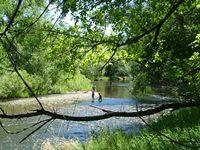Organizations and agencies are increasingly learning the importance of collaboration for ensuring that decisions and planning efforts are broadly supported and sustainable. This is made harder and more critical when the issues are complex and technical, and when they cross disciplinary boundaries and expertise.
CDR has been working with the City of Fort Collins to help create a health assessment tool for the Poudre River. The Poudre River is a treasured community asset as well one of the most developed rivers in the country. Ecological, agricultural, municipal, industrial, and recreational interests compete for this limited resource, both externally and within the City. The multiple beneficial uses range from delivering water to towns and farms, to providing habitat, flood protection, and quality of life for the community.
The goal of the “River Health Assessment Framework” was to quantitatively describe the City’s vision for a healthy and resilient Poudre River. To do so, the City created an interdisciplinary team that could pursue this goal through a broad, inclusive lens – recognizing the inherent competing challenges, as well as synergies, between the City’s goals of securing a stable water supply, managing stormwater and flood risk, and restoring and maintaining an ecologically healthy river.
CDR helped the City:
- structure a process in which the thorniest issues could be directly addressed directly
- ensure the process resulted in concrete early outcomes
- make sure these early successes could be built upon
- provide meaningful problem-solving around difficult issues
- bring in the necessary parties and ensure they were consulted at critical junctures
- assure the process was iterative and set up for a lasting, successful outcome
Why CDR’s facilitation expertise helped create buy-in and minimize internal conflict:
- we helped create a comprehensive, transparent process
- we were able to help frame complicated issues in tangible, constructive ways
- we helped challenge assumptions and dig beneath them to promote greater understanding
- we probed staff on difficult questions
The result was a testament to real-life collaboration:
- challenging, at times messy, complicated, and fast-paced
- a process that resulted in deeper mutual and cross-departmental understanding
- increased capacity for handling real and perceived conflict
The process culminated in a broadly supported tool that will have wide-ranging impacts for the city and beyond. The “River Health Assessment Framework” will be available in early July for public comment at http://www.fcgov.com/naturalareas/riverhealth.php.
For more information, contact Ryan Golten.

